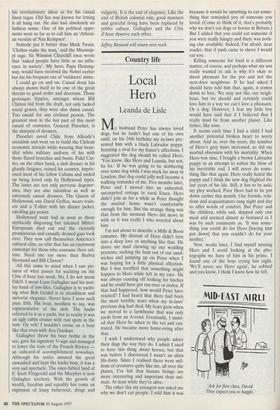Country life
Local Hero
Leanda de Lisle
My husband Peter has always loved dogs, but he hadn't had one of his own until, on his 24th birthday my in-laws pre- sented him with a black Labrador puppy. Scenting a rival for my fiancé's affections, I suggested the dog should be called Hero, `You know, like Hero and Leanda, but not, ha ha.' If he was going to be slobbering over some dog while I was stuck far away in London, that dog could jolly well become a walking reminder of me. Five months later, Peter and I moved into an unheated, uncarpeted cottage in rural Essex. Hero didn't join us for a while as Peter thought the marital home wasn't comfortable enough for him. But the strange thing was that from the moment Hero did move in with us it was really I who worried about him.
I'm not about to describe a Mills & Boon romance. My distrust of Hero didn't turn into a deep love or anything like that. He drove me mad chewing up our wedding presents, sucking the ham out of our sand- wiches and jumping up on Peter when I was hoping for a little physical affection. But I was terrified that something might happen to Hero while left in my care. He was always running off looking for bitches and he could have got run over or stolen. If that had happened, how would Peter have reacted? I had heard that there had been the most terrible tears when my in-laws' previous dog had died. My fears grew when we moved to a farmhouse that was only yards from an A-road. Eventually, I insist- ed that Hero be taken to the vet and cas- trated. He became more home-oving after that.
I wish I understood why people adore their dogs the way they do. I admit I used to have this thing about horses, but that was before I discovered I wasn't an alien life-form. Since I realised there were mil- lions of creatures quite like me, all over the planet, I've felt that human beings are more interesting and important than ani- mals. At least while they're alive.
The other day my youngest son asked me why we don't eat people. I told him it was because it would be upsetting to eat some- thing that reminded you of someone you loved. (Come to think of it, that's probably why we don't eat dogs or horses in Britain.) But I added that you could eat someone if you were really hungry and there was noth- ing else available. Indeed, I'm afraid, dear reader, that if push came to shove I would eat you.
Killing someone for food is a different matter, of course, and perhaps what my son really wanted to ask is why it's okay to shoot pheasant for the pot and not the next-door neighbour. If he had asked I should have told him that, again, it comes down to love. We may not like our neigh- bour, but we should and certainly could love him in a way we can't love a pheasant. Or a dog. However, I fear my little boy would have said that if I believed that I really must be from another planet. Like father, like sons.
It seems each time I had a child I had another potential broken heart to worry about. And as, over the years, the number of Hero's grey hairs increased, so did my morbid obsession with his mortality. When Hero was nine, I bought a brown Labrador puppy in an attempt to soften the blow of his inevitable end. I will never do some- thing like that again. Hero really hated the puppy and I think the new dog blighted the last years of his life. Still, it has to be said, my ploy worked. Poor Hero had to be put down earlier this month. Our friends, rela- tions and acquaintances rang night and day to offer words of comfort. But Peter and the children, while sad, skipped only one meal and seemed almost as bemused as I was by such comments as, 'It was some- thing you could do for Hero [having him put down] that you couldn't do for your mother.'
Now, weeks later, I find myself missing Hero and I avoid looking at the pho- tographs we have of him in his prime. I found one of the boys crying last night. `We'll never see Hero again', he sobbed and you know, I think I knew how he felt.
Ask for first class, David. They expect you to haggle.'


















































 Previous page
Previous page